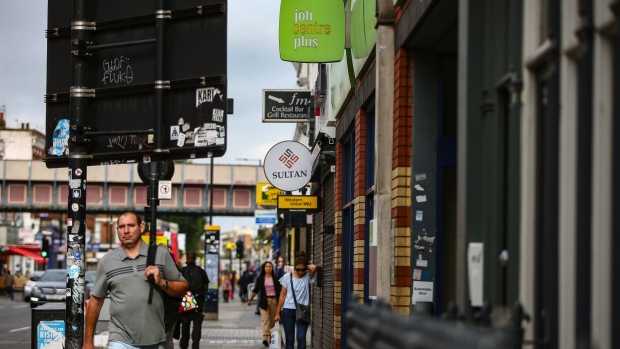Aug 16, 2020
Sunak Told Ending Furlough Puts 2 Million Viable Jobs in Peril
, Bloomberg News

(Bloomberg) --
Chancellor of the Exchequer Rishi Sunak is putting 2 million viable jobs in peril by ending his coronavirus jobs support program too early, risking an unnecessary unemployment crisis, according to a think tank.
The Institute for Public Policy Research estimates that 3 million workers will still be relying on the plan when it ends in October, two-thirds of whom are in roles that would be sustainable if the help was extended into next year.
Removing the support too early would “cause long-lasting damage to the economy and to people’s lives,” the authors of the report said.
The popular program is already being tapered, and the report may add to pressure on the government to extend the aid, which has so far helped support almost 10 million jobs.
Even with the plan, which currently pays 80% of an employee’s wage, there are signs the labor market is in crisis.
The U.K. saw the biggest drop in employment since 2009 in the second quarter, and scores of U.K. firms, including newsagent and stationery retailer WH Smith Plc and department store Debenhams Plc, are already reported to be cutting jobs.
Meanwhile the Bank of England, which has identified the labor market as the key risk to the U.K.’s recovery, estimates unemployment will almost double to 7.5% by the end of the year.
Still, Sunak insists the plan, which has cost the Treasury almost 35 billion pounds ($46 billion) so far, cannot last indefinitely. That’s partly due to the eye-watering price tag and because extending it may dissuade Britons from quitting jobs that may never return anyway, and hinder a necessary restructuring.
Read More: U.K.’s Economic Dilemma Is Mass Layoffs or Addiction to Aid
The IPPR recommended that, from October, the furlough plan be replaced by a Coronavirus Work-Sharing Scheme, which targets only jobs and businesses likely to be sustainable. That would run through March and cost just 7.9 billion pounds, it said.
The IPPR found that around 1 million roles currently supported by the program may never return, with retail, hospitality and manufacturing jobs particularly at risk. For these people, the government should look to scale up job creation efforts and overhaul the benefits system, the think tank said.
©2020 Bloomberg L.P.